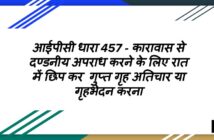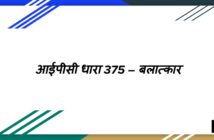Our activities revolve around the internet that we hardly realize how we are being exploited. For example, what happens to our data that is given online? Are we safe online? This article will discuss offences and punishment for cybercrime under the Information Technology Act, 2000 and the step-by-step process of filing a complaint about cybercrime.
Cybercrime is an unlawful act committed by cybercriminals or attackers using a computer network or the internet. There are many cybercrimes across the web. Some of these are hacking, denial-of-service attacks, cyberstalking, identity theft, cyber terrorism, etc.
While surfing online or using the internet, we should ensure our data is protected and not used by others.
Which offences are covered under the Information Technology Act, 2000?
Offences relating to cyber-crime that are mentioned under Information Technology Act 2000 are:
1. Tampering with computer source documents (Section 65)
When a person conceals, alters, or destroys any confidential computer source code that is used in a computer program, or computer system, or network shall be punished with imprisonment for up to three years or with fine up to 2 lakh rupees or with both.
2. Computer-related offences (Section 66)
Where a person commits any computer-related offence shall be punished with imprisonment up to three years or with a fine up to five lakh rupees or with both.
3. Sending offensive messages (Section 66A)
When a person sends any grossly offensive information, or any false information that causes enmity, hatred, insult, criminal intimidation, danger, inconvenience, annoyance, danger, etc. through any email or messages by any computer or communication devices, to mislead the origin of such message shall be punished with imprisonment up to 3 years and a fine.
4. Receiving stolen computer resources or communication devices (Section 66B)
When a person receives, retains any stolen computer resource or communication device, shall be punished with imprisonment of either description up to three years or a fine up to one lakh or with both.
5. Identity theft (Section 66C)
When a person dishonestly or fraudulently uses any password, electronic signature or other unique identification feature of any person, such person shall be liable to imprisonment of either description up to three years and a fine up to one lakh rupees.
6. Cheating by personation (Section 66D)
A person engaged in cheating by personation through a computer or a communication device shall be punished with imprisonment of either description up to three years and a fine of up to one lakh rupees.
7. Violation of Privacy (Section 66E)
A person is said to violate a person’s privacy if that person captures, publishes, or distributes any image of a person’s private area without the person’s consent. The person committing such offence shall be punished with imprisonment up to three years or with a fine of up to two lakhs or with both.
8. Cyber Terrorism (Section 66F)
When a person commits any unlawful act with the intent to threaten the integrity, sovereignty, or unity of the country or foreign state or to strike terror among the people by denying the person authorized to access the computer resource or using the resource without authorization or contaminate any computer, which causes the death or injury of a person or destroys any property or hinders any essential services that adversely affects the life of a person or security of the country or foreign state, such an act is called cyber terrorism. The person engaged in cyber-terrorism shall be punished with imprisonment for life.
9. Obscene materials (Section 67)
When a person publishes or transmits any material that arouses any sexual desire or that deprave (morally wrong) a person and has a negative impact on the person who watches, hear or read such material, shall be punished for first conviction with imprisonment of either description for up to three years and fine of up to five lakh rupees and for subsequent conviction with imprisonment of either description (rigorous or simple imprisonment) for up to five years and with fine up to ten lakh rupees.
10. Pornography (Section 67A)
If a person transmits or publishes any material containing sexual activities or conduct, they shall be punished for first conviction with imprisonment of either description for up to five years and fine of up to ten lakh rupees and for subsequent conviction with imprisonment of either description for up to seven years and with fine up to ten lakh rupees.
11. Child pornography (Section 67B)
When a person publishes or transmits any texts, videos, downloads, advertises, browses or seeks, etc. any electronic material showing children under the age of 18 years, engaged in any sexual activity or induces any child to engage in any sexually explicit act or abuses children online, shall be punished with imprisonment of either description which may extend to five years and fine up to ten lakh rupees for the first conviction. However, for any subsequent conviction, such a person shall be punished with imprisonment of either description up to seven years and a fine of up to ten lakh rupees.
How to file a complaint about cybercrime online?
There are five methods of reporting cybercrime online:
Website:
Cybercrime can be reported to a website that has an option of “flagging” or “reporting” the objectionable content. E.g., Social networking websites such as Facebook, Twitter, YouTube, etc., have the option of reporting harmful, sexual, adult, dangerous, abusive, spam, or misleading content.
Portal:
You can also file any type of cybercrime complaint online at National Cyber Crime Reporting Portal by clicking on the following link: https://cybercrime.gov.in
This portal can be used to register all types of cybercrime, whether you are an Indian citizen or not. To file a complaint, you need to first register to the portal with a valid mobile number.
Select the option for reporting either:
- Reporting crime related to Women/Child – crimes against women and children such as child pornography, distributing obscene materials or sexual content online, violation of privacy, etc., are reported at this option.
Here you have two options:
Report Anonymously – where you do not have to provide any personal detail. Nevertheless, the information provided should be true, accurate, and complete. The report should contain the victim’s location and where the crime has occurred. For reporting online child pornography or sexual content, the location of the complainant should be provided.
Report and Track option – wherein you have to fill in all the details that are being asked, including name, address, contact details, the complaint in brief, and any other information required.
- Report other Cybercrimes – Other cybercrimes such as hacking, ransomware, social media crime, identity theft, etc., can be reported at this option. A confirmation message via an email & SMS is sent to the complainant once reported. The status of the complaint can be checked through the “check status” option on the portal.
Helpline Number:
You can file your complaint about financial loss due to cyber fraud on the 1930-helpline number. This national helpline is operated by the Indian Cyber Crime Coordination Centre and is operational in many states.
Cybercrime Investigation Cell:
Another method of reporting a complaint is that when cybercrime is committed against a person or his property, the victim should report the information about the crime to the cybercrime investigation cell and an application letter.
The Application letter should contain:
(Details of the victim)
- Name:
- Email address:
- Contact number and
- Details specifying how the offence was committed.
- Copy or screenshot of the alleged email or other content depending on the type of crime.
Police Officer:
The victim can also seek help from a local police officer in case of an emergency. The IT Act, 2000 provides that the police officer not below the rank of “Inspector” shall investigate the cybercrime.
Conclusion
Cybercrime is any unlawful or illegal activity committed using the internet or computer system. The Information Technology Act, 2000 has laid down punishment for different types of cybercrimes. You can file your cybercrime complaint by using any of the methods mentioned above. It is to be noted that the cybercrime complaint should be true, accurate, and complete so that the police officer can investigate the matter. Furthermore, all the evidence supporting the complaints should be stored. And last but not least, though we are connected to the internet for our daily activities, it is our duty to ensure we use all the precautions while staying online. You can also check how to stay safe online at https://enyay.in/cyber-crimes-in-india/.

